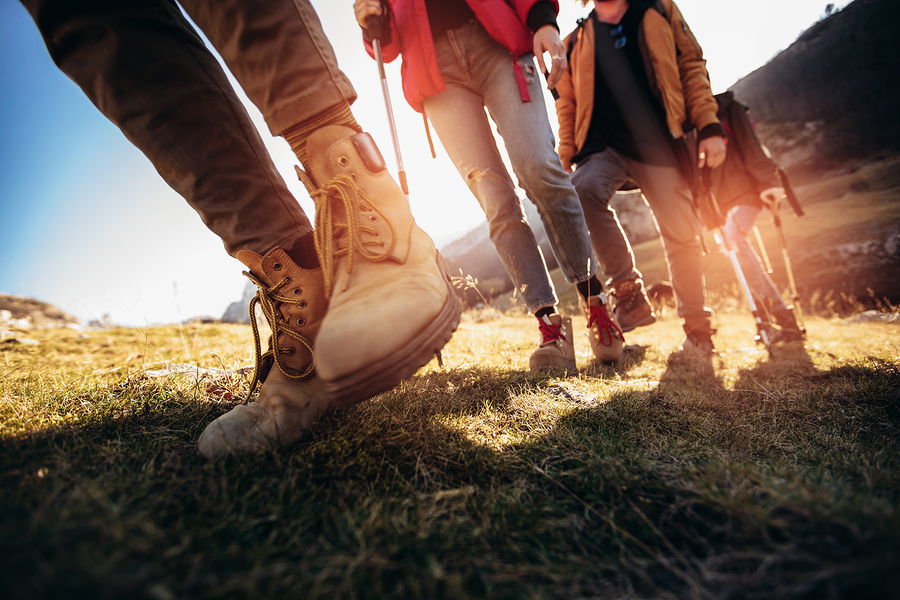Hiking for better health
Hiking can improve both our physical and mental health – you can quite literally de-stress as you walk. No wonder it’s gained in popularity recently with the combination of fresh air and nature and the added no cost bonus. What’s not to like!
AXA PPP healthcare physiologist, Sarah Kemp gives us some tips on the benefits of hiking and which precautions to take before you head off into the great outdoors.
Why hike rather than walk or run?
Hiking gives your whole body a good workout. Changes in terrain mean your upper body and stabiliser muscles are being used. If your route includes hills then your cardiovascular health will improve while working your glutes and quads at the same time. Walking is great but hiking is more challenging and so will work the body harder.
Joints are not stressed by hiking in the same way as going for a run for example; as it is relatively low impact, but it will still help support bone health. It is therefore an ideal way of exercising for the over 50’s when bone density naturally starts to decline.
Studies have shown that humans benefit by being in natural environments. Nature gives us restorative properties allowing us to de-stress and re-balance ourselves. Couple that with physical activity and you have the perfect combination to reduce the risks of depression and anxiety. Going on a hike can have a genuine positive impact on our mental health.
Hiking is an inclusive activity, suitable for a range of different people with differing abilities and can be very sociable too! Going on a hike with other people, whether they be friends, a partner, family or an organised hiking group can make it even more enjoyable.
The amount of exercise you get by hiking can be ramped up or toned down easily. Whether you feel like going for a 3-hour hike in the hills or only have time for a shorter, flatter route one day, hiking is the ultimate adaptable form of exercise. You can even load a rucksack on your back for extra bone and muscle strength if you want to push yourself that much harder.
And finally, the great thing about hiking is that it you can go anytime, anywhere and it is free. You can expand your mind by discovering new places while enjoying the benefits of being outside in the fresh air.
Tips on how to start
If you have not exercised in a while or have muscular or joint problems then there are a few precautions you should take before setting off.
- Start small – Don’t try and do too much too soon. Build up the distance you are planning to hike and perhaps start on flatter, easier terrain. This will help you to avoid injury and you won’t be too exhausted.
- Set yourself a goal – It’s always a good incentive to have a goal to work towards as this will encourage you to keep going, but do break your hike down into smaller ones and then build up to more distance or hillier terrain. And remember to congratulate yourself after each hike – you deserve it!
- Take a map and plan – this is important for your safety and to ensure your route is suitable for your ability.
- Always let someone know where you are going – It is vital to make sure others know where you’re going, especially if you are hiking alone. Many rural areas do not have mobile coverage and so a mobile phone won’t be any help if you get lost or injured.
- Factor in rest breaks – Rests are crucial if you are hiking a long way but be aware of getting a chill if you stop for too long.
- Always do a weather check – weather is unpredictable and can change rapidly so always check the weather forecast before leaving.
Hiking kit essentials
There are a few essentials you will need before you set off:
- Suitable hiking boots – a good sturdy pair of walking boots or shoes are essential for ankle protection and for sufficient grip. Boots should always be broken in before you set off though – a few short trips should do the trick as the last thing you want is sore feet!
- Lots of water – make sure you have plenty of water, as with any form of exercise, keeping hydrated is important.
- Suitable clothing – ensure that your clothing is appropriate for any weather. Layers are sensible as they can be taken off and put on as needed and a rain coat is always a must, even on a sunny day!
- Sun protection – sunscreen and a hat will help to protect your skin from over exposure to the sun. Apply sunscreen before you go and take it with you so you can top up as and when you need.
- A mobile phone – just as a safety precaution in case things don’t turn out as planned.
- Snacks – for topping up your energy levels, especially on a longer hike.
If you are well prepared and you build up slowly, hiking is a fantastic way to help boost your physical and mental wellbeing. Going for a hike is an enjoyable, effective all body workout that benefits in so many ways.
Disclaimer
All content on Silversurfers.com is provided for general information only, and should not be treated at all as a substitute for the medical advice of your own doctor or any other health care professional. Silversurfers will not be responsible or liable for any diagnosis made by a user based on the content on www.silversurfers.com and we are also not liable for the content of any external websites or links from or to Silversurfers to any other websites. Please always consult your own doctor if you’re in any way concerned about any aspect of your health.
Melina - Assistant Editor
Latest posts by Melina - Assistant Editor (see all)
- Banana bread with SunGold kiwis - February 20, 2025
- A tribute to Bob Marley - February 4, 2025
- Going to Work on an Egg! - January 29, 2025
- The Very Best of Petula Clark - January 14, 2025
- 50 Years of Coat Trends - January 12, 2025




















